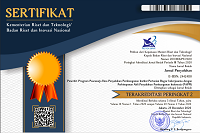Persepsi Pemuda terhadap Peranan Karang Taruna dalam Penanganan Masalah Sosial
Abstract
The government should work with the elements of society to solve a growing social problem, including organizations that exist at the village level. Karang Taruna as one of the youth organizations, is a partner that could take the role in solving social problems. The purpose of this study is to determine how youth perceptions of the Karang Taruna role and the factors that influence these perceptions. Descriptive analytical study design by incidental sampling techniques to 93 youths carried out at Bogor City. Data collection was conducted between February until April 2014. Processed data using regression analysis. The results showed that age, education, motivation, experience, interaction with organization, social environment, knowledge about the social problem and knowledge about karang taruna role in the implementation of social welfare influence statistically significant to youth perceptions about Karang Taruna’s role in solving social problems.
Keywords: role, karang taruna, perception, social problems, karang taruna
Downloads
Authors who publish with this journal agree to the following terms:
- Authors retain copyright and grant the journal right of first publication with the work simultaneously licensed under a

This work is licensed under a Creative Commons Attribution 4.0 International License that allows others to share the work with an acknowledgement of the work's authorship and initial publication in this journal. - Authors are able to enter into separate, additional contractual arrangements for the non-exclusive distribution of the journal's published version of the work (e.g., post it to an institutional repository or publish it in a book), with an acknowledgement of its initial publication in this journal.
- Authors are permitted and encouraged to post their work online (e.g., in institutional repositories or on their website) prior to and during the submission process, as it can lead to productive exchanges, as well as earlier and greater citation of published work (See The Effect of Open Access).















